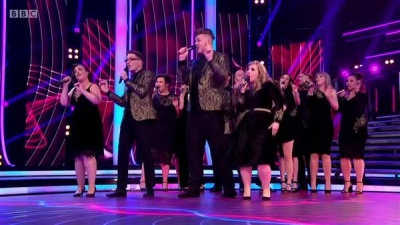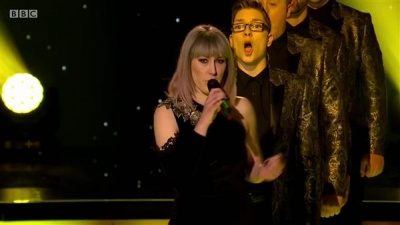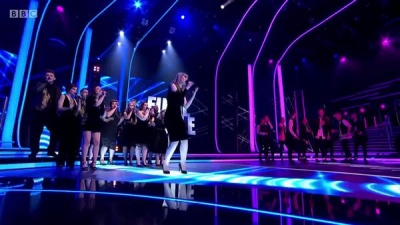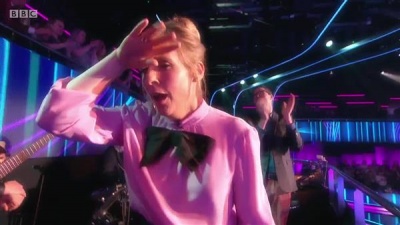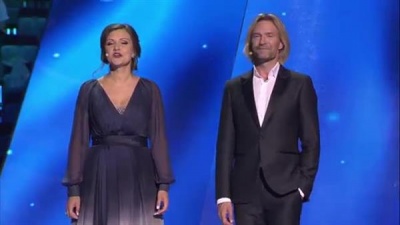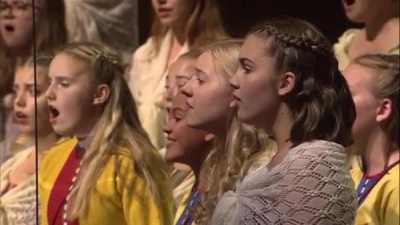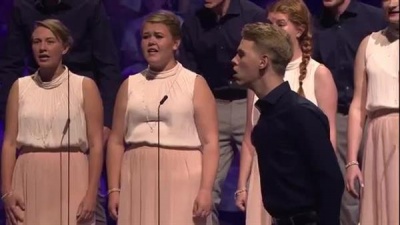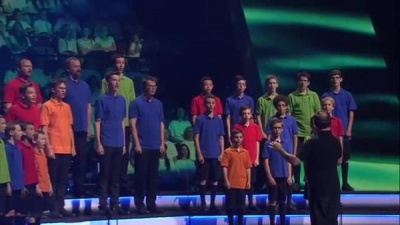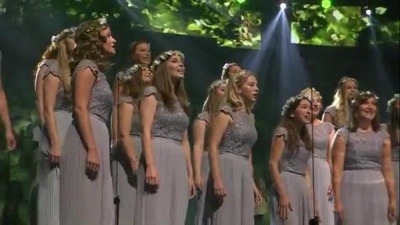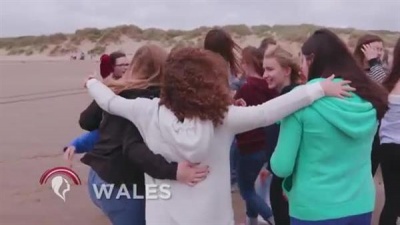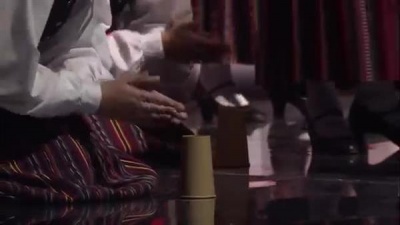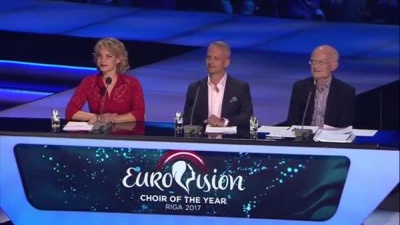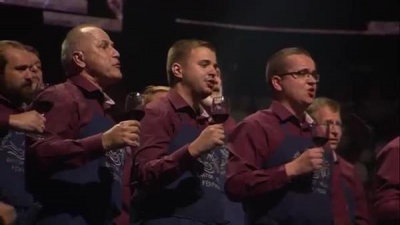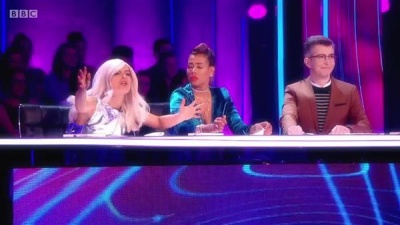Weaver's Week 2017-07-30
Last week | Weaver's Week Index | Next week
Compare and contrast: two choir programmes from last Saturday night.
Contents |
Pitch Battle
Tuesday's Child for BBC1, 17 June – 22 July
Pitch Battle is a very modern show. Yes, they've cut back on the singing so they can concentrate on the contestants' personalities. Each choir is introduced by a video. When both have had their moment, they perform an arrangement of a song they think shows off their talents best of all.
So, to start the show, it's the show-stopper. [sideways look]
Once both choirs have stopped their show-stopper, the judges start the critique. Gareth Malone (choirmaster from BBC2) and Kelis (pop singer) have an extra guest judge each week. They give feedback, constructive criticism of how the performers can improve in their next performance. The judges are encouraging and optimistic, their praise is often tempered with accurate criticism.
And there will be a next performance. The groups sing in the "riff-off", a medley of songs with a common link. For instance, the riff of "lonely" would lead to "All by myself", "Lonely no more", "Alone again naturally", and "Sue Lawley". Sorry, "So lonely".
The judges make their decision, sending one choir through to the next round, and one choir home. And then they repeat the whole process, three pairs of choirs fill the first hour.
Scooting ahead to this part of the final, it's clear that they have learned about how to order a programme. They stopped starting the show with show-stoppers, and started to start the show with the interval act. [sideways look]
Each of the winning choirs from the heats – plus a surprise picked by the judges – will perform with the guest judge from their heat. And by "perform with", we mean "get overshadowed by". Some people will have tuned in to hear Chaka Khan or Will Young, it wouldn't be the done thing to upstage this star attraction. But this is going to confuse the viewer: at the end of the day, are we voting for Joe Jonas, or the act he performed with?
(We're also going to raise an eyebrow as Pitch Battle is using the songs of R Kelly. Have they not heard the latest allegations? Has the BBC chosen to treat R Kelly as innocent until proven guilty, a privilege it did not extend to its own former employees?)
Going solo
What is the point of a choir. It's to work together, to take many people's contributions and make something bigger than any of them, right? Wrong. Back to the heats, where the three remaining choirs took part in the "Solo Sing". One nominated soloist takes the lead in a song. It's representative of the choir's oeuvre, and something they can perform well.
On the final heat, we heard a take on "Barcelona". Now, we know this song a bit too well. When this column worked in a record shop in the mid-90s, we used "Barcelona" every Monday to make sure the speakers were working, and sounding sweet. The separation between Monserrat Caballe's piercing soprano and Freddie Mercury's baritone had to be clear. We needed to hear both lines at once from all parts of the shop floor. For the rest of the week, we played new releases by CJ Lewis, Stiltskin, or PJ & Duncan. Whatever crud was coming out, we knew the speakers were not responsible for poor sound.
So, when we heard "Barcelona" on Pitch Battle, we knew something was going very wrong. There was a soprano line, and four baritones at the same time. Except we didn't hear all the lines, just a mush. The sound mixing just isn't right, the television show doesn't portray what must have happened in the studio. From time to time, the judges' decisions made no sense – until we realise that we don't hear what they hear.
The judges got to make comments during the performances: we might hear Gareth speak a few words during the break between line, or while the backing singers advance the song. Ever so slightly distracting. What we don't hear is anything from the audience: they can clap and cheer as much as they like, but it won't be heard on the show. Again, we don't hear what the judges hear.
This format was completely thrown out for the final. It's as if they knew it didn't work. After the interval act, and the riff-off came the a capella section. No band, just the singing. Just the choir, standing on some steps, being conducted by … no, sorry, that's the next review.
The a capella section is just the choir, unaccompanied. All sound needs to come from their own mouths. No instrumentation, no rhythm, not even a click track through their earpiece. The choirs claim this is the hardest thing they've ever done, but (as we'll see shortly), it's common in other contests.
Battle Round (With Cheese)
Two remained for the Battle Round. In the final, the voting lines opened here. Everything was done by internet computers, so the BBC don't need to reveal any information about the vote to anyone. The premium rate phone regulator doesn't need to know, because premium rate phonelines weren't used.
One song, two choirs, taking lines between each other. Yes, it's the battle round from BBC The Voice done differently. In the heats, the guest judge will join the choirs on stage. They'll sing with one, and that choir will be the winner. The final revealed its winner in the same way.
Overall, this was choir singing as lowbrow entertainment. Everything was pop music, versions and adaptations of hit singles – some of them written by the guest stars. It's a modern format, snippable and shareable in short bursts. The internet knows how to handle two-to-three minute clips of people singing.
We didn't get any excitement from the format. Many of the video pieces said that being in a choir formed close friends amongst disparate people. This is show business, so show us.
There are differences from the choir shows of the last decade, Last Choir Standing and Don't Stop Believing. And, like those shows, we don't expect to see Pitch Battle again. It's OK, it passes a summer's evening, but no better.
Eurovision Choir of the Year
LTV / Interkultur / Eurovision / Live Riga / Rondo for S4C and online, 22 July
Over to the Eurovision Choir of the Year. It's a very traditional show: they've cut back on the contestants' personalities so they can concentrate on the singing.
S4C does want to show the contestants, not least because the channel doesn't have a long history at Eurovision contests (some Jeux Sans Frontieres in the early 1990s, and that's it). The solution? Go on air half an hour before the contest, enough time to show the choir round Riga. This segment is hosted by the Côr Cymru staff, two in the studio and one out there with the choir.
Eurovision Choir began with an opening number, a piece composed by the host Eric Whitacre. None of your "mash-ups" of familiar pop repertoire, Eurovision Choir pushes the cultural envelope from the opening moment. A quick chat with the judges – soprano Elina Garanca, composer John Rutter, and conductor Nicolas Fink – and we're off.
ERR have the first entry, the ETV Girls Choir. Thirty young women perform an arrangement of "Absolute tormis", an ethereal piece with a great crescendo, and lots of swaying from side to side. Already, we have a difference from Pitch Battle, as we heard that crescendo. It finished loud, and it started quiet. Eurovision Choir allowed itself to have quiet bits and loud bits. There was no dynamic range on BBC1, everything was as loud as everything else.
We liked that performance, but was it good, great, middling? Help us put that in context, judges. "I understand what your roots are, what you want to communicate," says Elina. But can you explain it back to us? She can't, and John gives praise. The judges are only going to give praise, and we'll need to pick up on some very subtle nuances.
DR found the Academic Choir of Aarhus. The choirs have six minutes to perform one or more pieces. This entry is two pieces – the church-like "I serraillets have" and the "Wiigen-lied" with its shrieking conclusion. Both are novel pieces, in the idiom of late 20th century religious revival. The mixed choir is technically on point, but leaves us wanting less.
This is a Eurovision contest, so the postcards are present. A minute or so of the group enjoying themselves, finishing by a fast cut between shots of the members. Everyone will be famous across Europe for 0.12 seconds.
RTBF have chosen Les Pastoureaux, the shepherd boys. Mostly 14-18, they perform "Dans la troupe" and "Ensemble". Precise work, and they look the part in multi-coloured tops, though there's no choreography in their performance. "Artistic impression" is one of four criteria the judges have to use, and the only one not related to the voice.
S4C took an ad break, viewers to the feed spent three minutes learning about the World and European Choir Games. It's an event that reinforces petty nationalism through song.
Eurovision Choir is a contest between broadcasters, and WDR sent the Jazz Choir Freiburg. This one went to the top of our lists, "African call" was like the veldt on our television set. "Palettes" featured some beat-boxing. It's all here, and it's the first piece that makes us think ETV might not win it.
RTVSLO sent the young women of Carmen Manet, blending three traditional songs ("Ta na solbici", "Adrca", and "Aj, zelena je vsa gora") into one continuous piece. This becomes the one to catch: their singing is perfect, and they're telling a story as well. It's a woman's life: childhood, growing up, marriage, losing someone close. The choir looks like they mean what they're singing, in a way Les Pastoureaux didn't.
Bring out the wine! MTVA have the Bela Bartok choir, the one male voice choir tonight. "Karádi nóták" involves half-filled glasses of red wine, and lots of movement from loud to quiet and back again. Perhaps a little less variety than ideal, and certainly less storytelling than in the prior performance. The wine remains in the glasses, a schoolboy error that never happens in Splott.
Côr Merched Sir Gâr represent S4C, and even in the postcard we can feel the girls' tremendous energy. "O mountain o" ticks the Celtic ethereal box, there's a traditional lullaby, and an arrangement of "Wade in the water". A very clear sound, the soloists are working with the backdrop throughout. Afterwards, the choir talk to S4C's representative backstage, fizzing with delight and happy that they've done their best.
While we're watching that, and another ad break, viewers to the stream get on with it. Yes, S4C is showing the last two performances on a slight delay.
Hardchor Linz represent ÖRF, they take on "Ave Maria", "I tue wos I wü", and "Rah". Some of the women in this mixed choir have come in Alpine dress, some of the men have sunglasses on stage. It's slightly bizarre staging, evidence that the choir have fun as well as perform well. This leads into John Rutter talking about turnips...
And finally, hosts LTV sent Spigo, performing two folk songs of their tradition. Very close to the openers from ETV, and (in our view) we think ETV just have the stronger performance. This performance moved between modern and traditional, the earlier one showed a better meld of shout and soft singing.
The judges get a few minutes to consider the result. We reckon Carmen Manet first, with the huge energy from ETV Girls and Côr Merches Sir Gâr close behind. Can't rule our Jazz Choir Freiburg, they took us by surprise.
S4C have another ad break, and a short studio discussion, but we know they're not showing the contest entirely live. On the live stream, a quick look behind the scenes, and a preview of the Big Song they'll use to end the show in about ten minutes.
After this comes the recap, a nice simple opt-in for S4C. The winners? Announced from the back of an envelope, it's Carmen Manet. Gold tokens fall, the web stream goes to pot, and their conductor lifts the trophy. They'll get a hero's welcome back in Ljublijana.
The chorus in the hall sings their song to play out. Before we see that on S4C, there's another chance to see their choir's performance, and the post-match interviews. Pads out the programme so they can get out at 9pm; the contest proper finished about ten minutes earlier.
An authentic experience?
Eurovision Choir of the Year has a small albatross around its neck: the senior Song Contest has a reputation for glitter and glamour and meme-tastic GIFs. Some people will have seen "Eurovision" and "singing contest" and expected glitter cannon. Not tonight. In its own understated way, Choir of the Year did delivere these showbiz elements. The glitter wore sensible shoes, the glamour wore evening dresses, and someone's got GIFs of Hardchor Linz holding up cards, or Spigo playing their games on stage.
The thinking Eurovision community has a meme at the moment, "authenticity". Is this performance honest, is it genuine? Does it reflect the emotions of the performers? Is it sincere?
We reckon that every performance in Eurovision Choir was authentic. There was plenty of variety, choirs showing the full range of abilities. By sticking the show on cultural channels, choirs could sing their best works without any need to be mass-market.
The choirs were the only people on stage, they had our whole attention for the entire performance. No need to ignore the vocals of Jermaine Jackson, outsiders don't get a squeak. By having experts judge the contest, we were assured of a credible result that few could argue with.
On Pitch Battle? Authenticity was missing, and this is no slight against the choirs. The format prevented the choirs from presenting their best work. The choirs could only sing mainstream music, and performed with a band. Star guests want to show off their own work, they grab some of the attention from the choirs.
Choirs were singing to the producers' tune. Their artistic brilliance was compromised by the desire to "put on a good television show". Pitch Battle fell between two stools, and the viewers knew it. Not convincing as art, not entertaining, it was just a lumpen mess.
Eurovision never stops. Choir of the Year is scheduled to take place in 2019. The next Eurovision contest we know about is the Junior Song Contest, in Tiblisi on 26 November. Eurovision Young Dancers may or may not happen this year. And we heard this week how the Old Fogies' Eurovision Song Contest For Old People will be in Lisbon on 8-12 May next year.
This Week and Next
"Here is something technical and difficult. Here are some bumbling amateurs. Have a go." Mel and Sue will be swotting up on old Larry Grayson videos, as they've been appointed new hosts of Mel and Sue and The Generation Game.
The Beeb has been trying to bring back this format for donkey's years: after Bruce Forsyth and Larry Grayson came the Jim Davidson error. A pilot with Graham Norton went out some years ago, one with Miranda Hart has remained in the cupboard. We can see this working, back on Late Lunch Mel and Sue were spontaneous around ordinary people doing silly things. But that was twenty years ago, and they may have lost practice. Hope not.
Piste Off Channel 4 has put The Jump on hiatus. The broadcaster claims that it doesn't want to compete with another winter event on BBC2 next year. That event will mostly take place overnight and in the mornings, so wouldn't interfere with an entertainment show in the evenings. For our money, The Jump only worked as a one-week television event, scheduling it every Sunday for a month turned it from fun into a chore.
New and Noteworthy: the Quizzy Mondays podcast. Chris Ducklin and guests discuss intellectual quizzes on television, which this week means University Challenge. Jack McB of Jack's Online Writings adds some heft to the discussion.
University Challenge continued. Trinity Cambridge (Matthew Kingston, Owen Petrie, Maya Béar, Rahu Dev) played Bristol (Oliver Bowes, Kirsty Biggs, Sam Hosegood, Tom Hewett). Bristol won at a canter, 230-95.
Mastermind kicked off its 45th series. Chris Cummins won, scoring 26 after taking Paul Simon as his specialist subject. Unusually, the first programme wasn't a high-scoring match, allowing Cummins to pass in his round. Runner-up Charis Hughes scored 23. Sarah Stewart and James Hogg also participated.
Only Connect (2) was back, too. The Stewards (James Baillie, Samuel Cook, Sam Brennan) were resplendent in shimmering emerald gowns; the Parishioners (Tracey Rawlins, Ian Fellows, Andy Rawlins) featured one vicar. Highlight was the Parishioners spotting they could add "ella" to words. That, and an unexpected blast of the Saw Doctors, all the way from Tuam.
Victoria discussed everyone's favourite control-key sequences – we thought hers was the three-fingered interrupt Ctrl-G-T. Parishioners were always on top of the match, and won by 26-15.
BARB ratings in the week to 16 July.
- Top programme was Coronation Street (ITV, Mon, 7.85m). Top game show was BBC The Voice Kids (ITV, Sat, 3.95m).
- Next come Catchphrase (ITV, Sat, 3.35m) and Pointless Celebrities (BBC1, Sat, 3.05m), which both went out around the same time.
- Love Island (ITV2, Mon) continued with 2.65m viewers. Did the lovers beat the fighters? No: Game of Thrones (KYTV Soggy, Sun) pulled 3.5m pairs of eyes.
- The Crystal Maze continued to fall (C4, Thu, 1.8m), thanks to a very weak edition. BBC2's top game was Mock the Week (Thu, 1.65m).
- Love Island Aftersun kept 1.16m on ITV2 Sun, and a Celebrity Juice repeat had 570,000 on Wed. A League of Their Own had 460,000 hardcore fans on The Satellite Channel on Monday, and Who Wants to be a Millionaire registered 250,000 on Challenge. Two more questions to a million!
New series this week: Cash Trapped (ITV, weekdays), and Celebrity Big Brother (C5, from Tue). We've another chance to see The Code (BBC1, weekdays), and Challenge has bought rights to The Cube (weekdays).
Photo credits: Tuesday's Child, LTV / Eurovision.
To have Weaver's Week emailed to you on publication day, receive our exclusive TV roundup of the game shows in the week ahead, and chat to other ukgameshows.com readers, sign up to our Yahoo! Group.


